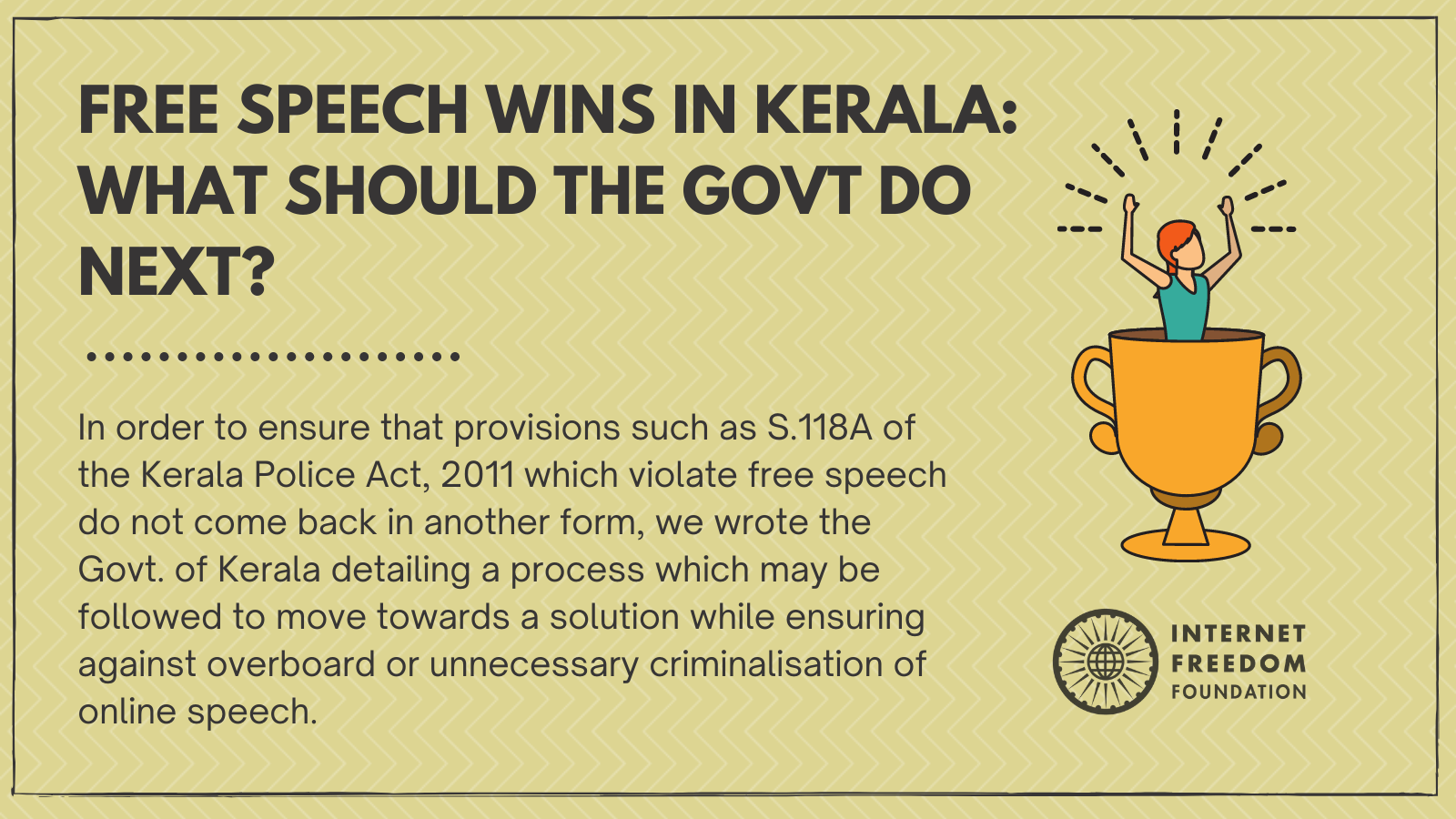
tl;dr
The withdrawal of the much criticised Section 118A of the Kerala Police Act, 2011, does not mean such proposals may not arise in future. Today we made clear proposals to the Government of Kerala to help avoid any overbroad or unnecessary criminalisation of online speech while also making sure abuse, threats or any of the harms that emerge on social media can be checked.
Background on S.118A of the Kerala Police Act, 2011
The Government of Kerala announced on October 21, 2020 its decision to amend the Kerala Police Act, 2011 through an Ordinance. The amendment inserted Section 118A that was ostensibly aimed to prevent cyber attacks against women and children. We noted with concern that the text of this provision had not been made available on the official websites of the Government of Kerala and neither had it been put towards any public consultation. This deviated from the norm of transparency and pre-legislative consultation.
It was also a matter of concern that this amendment was introduced through Ordinance which raised serious concerns about its validity. It was our opinion that any such amendment which curbs free speech on the internet needed to undergo sufficient legal scrutiny which can be achieved only if it is discussed and debated upon by the state legislature. Thus, we wrote to the Government of Kerala on October 24, 2020 highlighting these concerns. Subsequently, the Government of Kerala announced its decision to repeal Section 118A.
What should do the Government do next?
The withdrawal of the much criticised Section 118A of the Kerala Police Act, 2011, does not mean such proposals may not arise in future. Today, we have written to the Chief Minister of Kerala, Shri Pinarayi Vijayan with suggestions on the process that may be followed in future to move from controversy towards solutions to meet the objectives of checking online abuse, threats and misinformation.
First, Adoption of a public, deliberative process : In order to ensure that all relevant stakeholders provide suggestions, the Govt. of Kerala should draft and release a consultation paper. Such a paper may be put to transparent, public consultation following a model of participatory democracy thereby deepening the trust of people in any recommendations which are made subsequently. It should specifically, explain the need for which the provision is being enacted; look beyond the law and criminalisation and address civic issues such as digital literacy, online norm building behaviour and platform accountability; consult with local groups who may provide deeper insights into the issue.
Second, Positive acknowledgment of the role of digital media : There is a tendency in such conversations to often focus on the harms that may be not be balanced with the benefits of digital communications. Here, it is also important to highlight the various beneficial aspects of digital media as well to ensure that over-regulation does not lead to over-broad censorship. This can be clustered into two broad categories. First, access to the internet links to fundamental rights as held by the Hon’ble Supreme Court in its landmark decisions in Shreya Singhal v. Union of India (2013) 12 SCC 73 and Anuradha Bhasin v. Union of India 2020 SCC OnLine SC 25. Second, make reference to international digital rights standards such as the Universal Declaration of Human Rights, International Covenant on Civil and Political Rights (ICCPR) and specific guidance by the UN Special Rapporteur on the Right to Freedom of Opinion and Expression.
Third, seek clear legal opinion : If the outcome of any of the recommendations through this public consultation process is towards any legal provisions we urge that this legal opinion should be sought from the Kerala Advocate General. This legal opinion and the provision should be made public. This will help public scrutiny and feedback, deepen trust. It will also help scrutiny with established Supreme Court precedents through the participation of a growing number of legal experts, academics and practitioners who actively engage in such debates.
Finally, put any proposal to legislative scrutiny.
Finally, it must be ensured that any provision which is developed through such a transparent process is also laid in front of the State legislature for scrutiny. We must consciously move from the use of ordinance making powers. The introduction of the S.118A through ordinance was one of its many failings as it did not follow the due process of parliamentary debate and scrutiny.
This is a collective victory for local civil society groups
The decision of the Government of Kerala to repeal S.118A of the Kerala Police Act, 2011 is an emphatic win for civil society groups who vehemently opposed the provision by highlighting the free speech risks it posed. Local groups such as the Women in Cinema Collective (WCC) and local press were instrumental in ensuring that the Government was aware of the will of the people and their sustained opposition to the provision. Here, it is also pertinent to mention the close to 8 petitions that were filed against the provision in the High Court of Kerala. This shows that a vibrant and active civil society is essential to ensure that digital rights of the citizens of India are protected and upheld.

